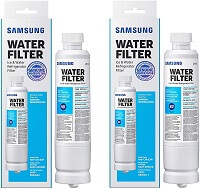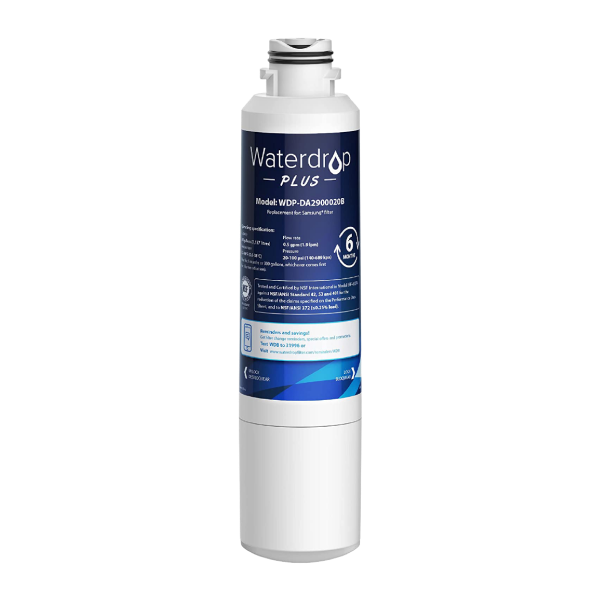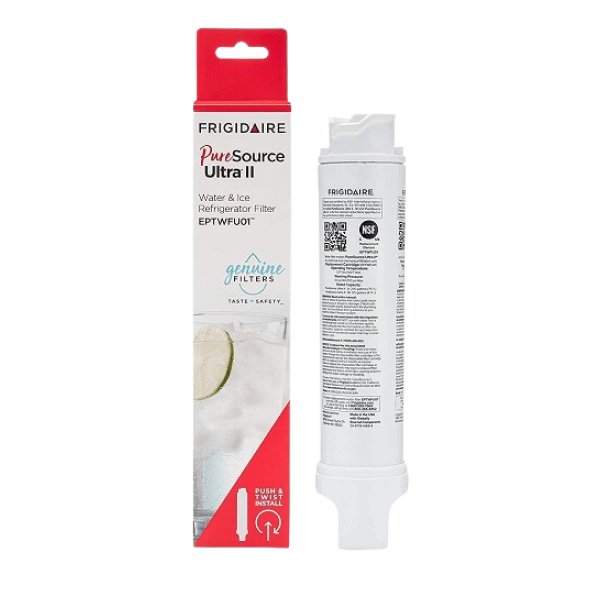Having access to safe, clean drinking water is an essential aspect to leading a healthy life which many parts of the world are lacking. Maintaining proper filtration is just one method of many wherein we may create a trustworthy water from natural sources. For corners of the globe lucky enough to possess treated municipal water, as well as electricity and refrigeration, fridge filters supply cool, filtered drinking water in a convenient location. If you are currently utilizing the water dispenser in your refrigerator, have you considered the condition of the filter? When it comes time to replace your fridge filter, there are a few important features to look out for, in order to prevent your family from consuming dangerous chemicals and contaminants. If this is something you're concerned with, for good reason, we have compiled a guide to finding the best fridge filters for your convenience.
Choosing the Best Filter for Your Fridge
Not all refrigerator water filters are the same – read that again. Today's market is saturated with varying refrigerator models, with or without water dispensers. As such, it's easy to see why there are countless fridge water filters to choose from, leaving many homeowners feeling frustrated. With each passing year, quality differences have changed, and will continue to do so for the foreseeable future. One aspect seems to remain constant with this type of filter, however, as the majority of fridge filters utilize granular activated carbon, or GAC.
Different Refrigerator Water Filter Styles
Water filters are a diverse product, with varying styles, features, unique designs, and even materials. Many of these filtration devices are capable of performing two functions simultaneously, in order to aid in the operation of the fridge itself, as well as water filtration. Such operations also serve to protect various mechanics within the filter from impurities which may originate in specific portions of the moving components found inside the fridge.
Activated Carbon
As a commonly utilized bacteria and odor absorbent, activated carbon goes to work removing unpleasant elements frequently found in treated tap water. While this simple style of filtration is cheap and effective, it comes at the price of frequent filter replacements in order to maintain efficiency. Additionally, because ice makers also take advantage of the fridge filter, some of the filter's overall lifespan is devoted to ice production. This essentially means GAC may not be the workhorse capable of meeting the demanded of your household.
Adhering to Regular Water Filtration Replacements
The frequency in which you replace your refrigerator water filter is highly dependent upon demand, such as the amount of people residing within your home. For example, a family of six will wear down a water filter more quickly than one person would, especially when one is a large consumer of ice, and the other isn't.
Indicators of a Replacement
Many fridge models are supplied with a light that illuminates whenever it's time to replace the water filter. However, this is not always the case, and there are other signs it may be time to make a replacement. If you begin to notice a taste difference in your water or ice, it's safe to say you should replace your fridge filter. You can also use a sticker or calendar to keep track of how many days, weeks, or months have passed since your last filter replacement.
Considerations of Choosing a Refrigerator Filter
In an effort to maintain higher levels of safety, there is a lot of consideration and effort behind the production of each water filter. This includes enacting the most appropriate manufacturing standards, certifications, safety protocol, and more. These procedures are actively put into place in order to ensure each water filter manufacturer follows specific guidelines, ensuring overall consumers safety.
NSF Certification
The water safety testing and certification standards set forth by the NSF are considered to be the highest, most rigorous standards of the water filtration industry. NSF certification standards are used throughout countries such as the US, Europe, and even Australia. The World Health Organization, or WHO, even utilizes the NSF to provide the standard for drinking water filtration and safety. If you take notice of a number alongside the NSF mark, know that it refers to the certification standard adhered to.
The American Water Quality Association, or WQA (Water Quality Association) is held as the authority of water quality in the United States of America. The WQA represents the water treatment industry as a whole, as well as practitioners, in addition to the interests of numerous enterprises. In order to provide comprehensive support, the WQA works to promote the effective development of the water industry around the globe.
Drinkability Test - NSF Standard 42
As mentioned, the NSF is in charge of the development, promotion, and enforcement of a whole slew of safety standards most manufacturer of water filtration products must abide by. One of the tests commonly used to measure the overall removal rate of contaminants is known as NSF Standard 42.
Water Quality Health Test - NSF Standard 53
This test is used to determine whether or not any given the material used within a filter is safe to use. In addition to verifying whether product information is accurate, as well as product structure, the standard 53 tests the filtration capabilities of pollutants including: cysts, lead, and volatile organic compounds (or VOCs).
Water Flow Rate
Several aspects have an influence on flow rate, including pipe diameter, friction loss, and water velocity. Water flow is defined as the amount of water running through any given surface, one unit at a time. In essence, flow rate measures the speed of which water flows through residential or commercial piping. This measurement also plays a vital role in determining the proper system for your household and appliances, regardless of whether it's a UV system, carbon filter, or water softener. When you choose the most appropriate flow rate, a home treatment system should be capable of:
- Filtering out countless contaminants
- Provide adequate contact with filter media
- Effectively treat water at peak use times
- Prevent excessive water pressure
- Avoid loss of water flow
Efficient Removal of Contaminants
The main purpose of a water filtration cartridge, especially in a refrigerator, is to neutralize and remove contaminants and solids. Additionally, many filter models efficiently remove: herbicides, pesticides, benzene, chlorine, lead, mercury, water cysts, particles, and more. However, it should be noted, not every filter is created equal. The reality is, there are many water filters on the market that are incapable of removing or reducing contaminants. In order to determine your needs, in terms of contaminant removal, it's important to utilize water reports. You can purchase water testing kits and easily test your tap water at home. This better enables homeowners to make informed decisions, and narrow down the specific water filter that will be well worth the investment. By using the NSF's contaminant selection guide, you can browse various filtration products, categorized by certifications, and more.

Refrigerator Water Filter Review
Samsung Genuine DA29-00020B Refrigerator Water Filter
The Samsung Genuine DA29-00020B is known for its consistency and its ability to deliver pure and tasty drinking water. As is the case with the higher-end models in this market, this unit can handle cleaning water successfully for up to six months or up to 300 gallons of water before needing replacement. This model usually retails for approximately $50 - $55, so it is a bit on the expensive side when compared to other filters.
Waterdrop Replacement for Samsung DA29-00020B Fridge Water Filter
Waterdrop filters have comprehensive certification from WQA, IAPMO, and NSF 401, 53, 42 and 372. To achieve these standards, the filter cartridge is thoroughly tested to ensure perfect filtration. The NSF 401 certification shows that it significantly reduces levels of ibuprofen, phenytoin, naproxen, estrone, bisphenol A, and nonylphenol. Additionally, it has also achieved the NSF 53 standard for removing mercury, benzene, and lead from water. This refrigerator filters significantly reduce the levels of many different harmful substances in your water, including chlorine, heavy metals, lead, mercury, odor, large particles, and many other major impurities. The filter additionally allows through many of the beneficial minerals in water that are essential for health. Waterdrop uses coconut shell carbon blocks supplied from Sri Lanka that have enlarged surface area and more micropores than inferior carbon blocks. The filter cartridge is far more effective in reducing levels of chlorine, dirt, sediment, rust, and a wide range of heavy metals. In line with our high level of attention to detail, we have chosen a BPA-free and food-grade housing for the filter that exceeds the NSF 372 certification for lead-free filtration.
Frigidaire EPTWFU01 Water Filter
Frigidaire offers several different fridge water filters, and if you choose that brand you should do so based on what type of refrigerator you have in your home. The EPTWFU01 Water Filter is known for its ruthless ability to eliminate problematic substances in tap water, and it enjoys tested certification with NSF for standards 42, 53 and 401.
Share Your Opinion on Water Filtration
If you find yourself questioning your needs in terms of refrigerator water filtration, NSF certification, and more, please don't hesitate to reach out. Please feel free to utilize the comment section below, or skip the wait and contact us directly through the contact form.






